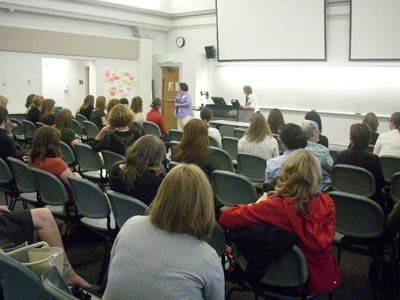“I came to Mines and it was 500 boys and a river of beer,” said Dr. Susan Rhodes in reference to her experiences as a freshman at Colorado School of Mines in 1975. Rhodes spoke as a portion of the Women of Mines events at the 2012 alumni weekend, which celebrated the contributions of female CSM students and alumni.
The morning plenary session focused on the history of women at the Colorado School of Mines from the institution’s beginning until the present. Although the Colorado School of Mines was founded as a coeducational institution in 1874, the first woman did not graduate until Florence Caldwell earned her degree in civil engineering in 1898. In the next forty-five years, fewer than five women graduated CSM. In the late-1960’s and 1970’s, though, the pace rapidly picked up, and CSM now boasts 4,385 female alumni.
To commemorate the progress made by women in the past fifty years, the Women of Mines committee invited six women to speak on their experiences at CSM. The first was Mary McGill Edwards, who graduated in 1962 with a degree in petroleum engineering. Edwards summed up her experience, saying, “I can’t say that there was latent discrimination from anyone in the faculty, but there was the problem that we were onesies, onesies and twosies and they didn’t make any effort to accommodate anyone but the 99s.” She also recounted ongoing trouble with finding ladies’ rooms and of what to do with women in physical education and ROTC courses.
The next speaker was Rhodes, who graduated with a bachelor’s degree in mathematics and a minor in mining engineering in 1979 and a master’s and Ph.D. in petroleum engineering in 1984 and 1987 respectively. Rhodes offered an anecdote and advice filled talk about the culture of Mines in the 1970s and careers in engineering. She explained that although she had great friends and support within the institution, she sometimes had awkward experiences and finding a job after she graduated was difficult.
As a current member of management at Sandia National Laboratories, she advised students that when it came to hiring, “I look for someone who sticks out… there’s something different about this person… I also look for someone who’s done community service… someone that I can connect with.” In a new job, Rhodes reminded listeners, “You have to make sure every manager… knows who you are and what you do.”
The next speaker was Noelle Cochran, who graduated in 1986 as a civil engineer. “We did have a fair number of women, although the program that I was in was rather small,” she said of her time at Mines She spoke mostly on her career, mentioning obstacles she had faced, including being mistaken for an assistant, being unsure when or if to talk, and work-life balance. However, Cochran felt that the benefits of her education and her job, like great projects, learning opportunities, mentoring relationships, and volunteer activities, far outweighed the difficulties.
The 1990s were represented by Julia White, who graduated in 1993 after studying environmental science and engineering. Her experience at Mines was defined by the many leadership positions she and her female colleagues took upon themselves. During the early 1990s, female students worked to found, among other things, women’s soccer, cheerleading, and what would become the annual Society of Women Engineers Evening with Industry. White herself was the president of the Society of Women Engineers for the 1990-1991 school year and helped found Evening with Industry. She was also a vice president in AIChE during the 1992-1993 school year.
Aprill Nelson, a petroleum engineer who graduated in 2008, and Georgie Zellnick, a current geophysics junior, also spoke on their similar experiences at Mines. Nelson was involved on campus as a member of the McBride Honors Program and three professional societies and as a student trustee. She laughed that she “only really applied because there was no application fee and no essay.” She reported career obstacles of communication, work-life balance, perspective – balancing tough decisions, and compassion.
Zellnick reported proudly on CSM and the world’s first all-female Mine Rescue Team as well as her own successful networking and academic career. She recounted an incident at a mining competition wherein an older man told a female CSM Mine Rescue Team Member that her teammates would never respect her. She responded, “That’s not how we do it in Colorado” and proceeded to place well in the competition.
After a luncheon, attendees reconvened and discussed five topics in small groups. The topics were navigating the corporate ladder, using power well, entrepreneurial experience, dual careers and international careers, and the academic orientation. Several key themes emerged from these conversations, notably the importance of networking, mentoring, doing what one is passionate about, and always learning.
Women of Mines offered an opportunity for female students and alumni to connect and see a variety of perspectives, from leadership positions and scholarly successes to careers involving what plenary session speaker Cochran described as “the armpits of the United States.”



'Women of Mines honors those who went before' has no comments
Be the first to comment this post!